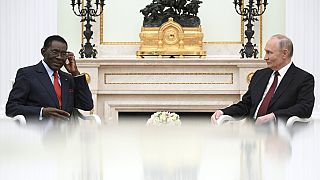Equatorial Guinea
The African Development Bank Group has urged countries on the continent to break down all barriers to trade and investment.
The Bank’s President Akinwuni Adesina made the call at the opening ceremony of the 54th Annual Meeting of the lender in Malabo, Equitorial Guinea. Adesina also urged countries to accelerate regional integration.
“This is the first time the Bank is holding its Annual Meeting in the critically important Central Africa region. In the past several years, we have invested over $13 billion in the region. And for every dollar invested, the region has leveraged $36, an incredible rate of return of 36 times”, said Adesina.
He expressed optimism abot the newly minted Africa Continental Free Trade Area which is expected to make Africa the largest free trade zone in the world, with a combined GDP of over $3.3 trillion. Adesina said pulling down tariff barriers alone, would spur trade by at least 53%, and with the elimination of non-tariff barriers, trade could potentially double.
“And the future of the African continent is getting brighter. The 2019 African Economic Outlook of the African Development Bank shows general economic performance has continued to recover. Growth is projected at 4% in 2019 and 4.1% in 2020. This is a strong momentum, from the growth of only 2.1% posted as recently as 2016”, said Adesina.
To help accelerate regional integration in Africa, Adesina said the Bank had been at the forefront in the development of critical infrastructure.
“We’ve provided $16 million to ECOWAS to support feasibility studies for the Lagos-Abidjan highway. Our investment in the 1,000 km Addis Ababa-Nairobi-Mombassa highway is transforming trade between Ethiopia and Kenya, which has risen by 400%”, the AfDB president noted.
The president of Equatorial Guinea Teodoro Obiang Nguema said Africa ought to take history lessons as it pursues growth and development. He noted that countries should prioritize technology to drive further growth.












00:31
Mauritanian economist elected African Development Bank president
01:01
AfDB downgrades Africa growth outlook but sees signs of resilience
Go to video
What is Sidi Ould Tah’s Vision for the AfDB?
04:49
African leaders create fund to provide cheaper debt
00:50
African development bank approves $108 million loan for Zambia
Go to video
South Africa: AfDB to lend $1 billion to Transnet